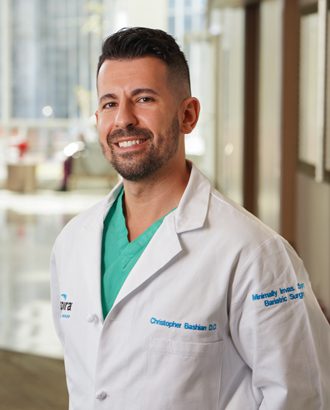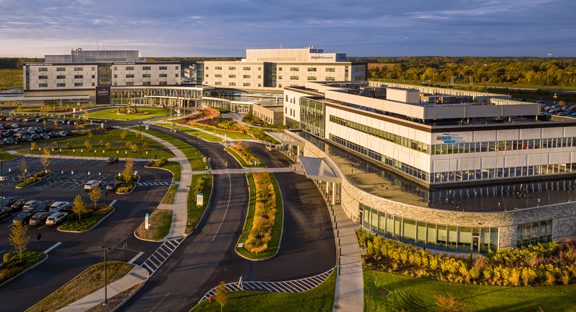The Inspira Difference

Partnering with patients for long-lasting (and life-changing) weight loss
You’ve heard it all before. If you are overweight, you should just stop eating. You should exercise more. Stop being so lazy. For decades and decades, adults who have struggled with their weight have been bullied, mocked, ostracized and, maybe even worse, sold products that promised the world but never worked.
At Inspira Health, the message is different: If you partner with us, we will help you become a healthier version of yourself. It’s a partnership that has already changed the lives of many South Jersey residents.

Christopher Bashian, DO, FASBMS
“We see patients who have been struggling with weight for a very long time, and they feel hopeless. A lot of them feel like they don’t know where to turn,” says Christopher Bashian, DO, FASBMS, Director of the Metabolic and Bariatric Surgery Program at Inspira Medical Center Mullica Hill.
“If we want to see true success, which we define as weight loss that’s long-lasting, you need an all-encompassing approach with a dedicated team: your doctor, dieticians, program coordinator, mental health specialists, consulting physicians. At Inspira Health, we don’t see weight loss in the short term and then forget about it. We follow patients for life because we believe support and education are what people truly need. That sets our program apart.”
Surgical Options
As a bariatric surgeon, Dr. Bashian most often performs a vertical sleeve gastrectomy, where he divides the stomach in half vertically, from the bottom of the stomach to the top. He describes the stomach after surgery as tube-shaped, like a banana. The other portion of the stomach is removed from the body.
“The gastric sleeve benefits patients in two ways,” he explains. “Patients now have a smaller stomach, so that limits the quantity of food you can eat at one time. And that piece of stomach that gets removed from the body is where the hunger hormone called ghrelin is made. So by removing that piece, it decreases your appetite after the operation.”
The surgery is performed robotically, a recent advancement in bariatric surgery.
“The robot has consistently shown to provide patients with quicker recovery, less pain, less need for narcotic pain medications – which we have completely eliminated from our practice – less time in the hospital and minimal side effects. It has completely changed the landscape when it comes to doing weight loss operations.”
Another surgical option is the roux-en-Y gastric bypass, however, I only recommended this for certain patients. I reserve this operation for patients who have significant acid reflux, which can lead to what we refer to as Barrett’s esophagus, a precancerous state in the esophagus. I also use gastric bypass as a revision procedure for those who have already had a weightloss operation and have either had complications from an older technique, or have experienced weight re-gain,” says Dr. Bashian.
Less Invasive, Better Results
In addition to the minimally invasive aspect of the procedure, Dr. Bashian notes that there have been many other advancements in bariatric surgery, so when patients express concern about side effects they heard from someone who had weight loss surgery years ago, he can quickly ease their fears.
“There’s a big misconception with these operations that after surgery, you’re going to have abdominal pain, you can’t keep anything down, you’re going to be starving all the time. When performed correctly, those issues are not present, and they shouldn’t be. This field of surgery has come a very long way. What bariatric surgery used to be is certainly not what it is today,” he says.
“There are studies comparing the complication profiles of gastric sleeve and gastric bypass surgeries with gallbladder and appendix surgeries – two of the most common general surgery operations performed worldwide. They found that bariatric operations actually had fewer complications than patients who had appendectomies and gallbladder surgeries. The way these operations have been developed has really made them extremely safe. The risk of complication is so low. We rarely see any sort of issues.”

“If we want to see true success, which we define as weight loss that’s long-lasting, you need an all-encompassing approach with a dedicated team… We follow patients for life because we believe support and education are what people truly need. That sets our program apart.”
The Team Approach
Dr. Bashian stresses that patients who opt for bariatric surgery should never feel they are on their own once surgery is complete. “We go above and beyond to provide the education, support and coaching people need,” he says. “We really try to support the lifestyle changes needed to have true success.”
“We provide online information sessions, support groups, and counsel from each member of our team including myself, our weight-management nurse practitioner, and our bariatric program coordinator, who is also a dietitian. Our nurse practitioner can also recommend and prescribe weight loss medications, which sometimes work in tandem with surgery. We also partner with The Fitness Connection, which is an athletic training facility and a gym that also has physical therapy. I see patients once a month before surgery. And we see them at one week post-op, then one month, three months, six months, one year, and then annually. In between all of that, patients are seeing our dietitians, talking with our coordinator, seeing our nurse practitioner, and seeing their other doctors. We’re educating and supporting patients from every avenue. The support we provide is consistent and frequent. Our goal is to provide what they need for long-lasting success.”
Thinking about bariatric surgery?
For many patients who struggle with the many diseases linked to obesity – diabetes, heart disease, osteoarthritis, high blood pressure and more – bariatric surgery has been proven to improve their health, decrease the need for daily medications and provide a better overall quality of life. But taking that first step isn’t always easy.
“The only way you’re truly going to know if bariatric surgery is a good option for you is if you come in and get all of the information from us,” says Christopher Bashian, DO, FASBMS, Director of the Metabolic and Bariatric Surgery Program at Inspira Medical Center Mullica Hill.
“If you are not ready for it, you shouldn’t do it, but get all your questions answered before you make that decision. Once you meet with us, it doesn’t matter how many times we see you. If you don’t feel ready for the operation, you don’t have to do it. You can even join the program and opt out at any point. Bariatric surgery is for people who are motivated and driven because that is when you see true, long-lasting success. This all comes down to education and support, and that is what we’re here to provide.”
Metabolic and Bariatric Surgery
Inspira Medical Center Mullica Hill
698 Mullica Hill Road | Suite 310
Mullica Hill, NJ 08062
856-508-3706 | inspirahealthnetwork.org


